
News
Авг . 28, 2024 21:49 Back to list
edta metal chelating agent
EDTA The Versatile Metal Chelating Agent
Ethylenediaminetetraacetic acid, commonly known as EDTA, is a powerful chelating agent widely used in various fields, including medicine, agriculture, and environmental science. Its ability to bind metal ions makes it an essential tool for managing metal toxicity, enhancing nutrient availability, and facilitating analytical chemistry processes.
EDTA is a synthetic amino acid that can effectively form stable complexes with most divalent and trivalent metal ions, including lead, mercury, calcium, and iron. The molecular structure of EDTA contains four carboxylic acid groups and two amine groups that allow it to bind metal ions tightly, preventing them from participating in chemical reactions that could lead to harmful effects. This property of EDTA is particularly beneficial in medical applications for treating heavy metal poisoning.
EDTA The Versatile Metal Chelating Agent
EDTA's applications extend beyond medicine into agriculture. It is employed in fertilizers as a means to increase the bioavailability of essential metal nutrients such as iron, zinc, and manganese for plants. In alkaline soils, these vital nutrients can become locked in forms that plants cannot access. By using EDTA, farmers can enhance nutrient uptake, leading to improved plant health and yields. This is particularly important in sustainable agriculture practices where nutrient management is critical for environmental health.
edta metal chelating agent

Moreover, EDTA plays a crucial role in environmental remediation. Contaminated soils and water bodies suffered from heavy metal accumulation pose significant risks to ecosystems and human health. EDTA is used in soil washing and other remediation processes to extract heavy metals from contaminated sites. Its effectiveness in binding with toxic metals makes it an indispensable tool for environmental scientists working to reclaim polluted habitats.
In laboratory settings, EDTA is commonly utilized in analytical chemistry to remove metal ions from solutions, aiding in the accurate analysis of samples. Its ability to form stable complexes helps prevent interference from trace metal ions during analytical procedures, ensuring the reliability of results.
Despite its numerous advantages, concerns have been raised regarding the long-term use of EDTA, especially in environmental applications. Its stability in the environment can lead to potential accumulation and unforeseen ecological effects. Researchers are exploring alternative biodegradable chelators that can provide similar benefits without long-term environmental consequences.
In conclusion, EDTA is a remarkable metal chelating agent with a wide range of applications across various fields. From medical treatments for heavy metal poisoning to enhancing agricultural productivity and facilitating environmental clean-up, EDTA continues to be an essential chemical in our pursuit of health and sustainability. However, as with any chemical, careful consideration of its environmental impact is essential as we strive for innovative solutions to modern challenges.
-
Polyaspartic Acid Salts in Agricultural Fertilizers: A Sustainable Solution
NewsJul.21,2025
-
OEM Chelating Agent Preservative Supplier & Manufacturer High-Quality Customized Solutions
NewsJul.08,2025
-
OEM Potassium Chelating Agent Manufacturer - Custom Potassium Oxalate & Citrate Solutions
NewsJul.08,2025
-
OEM Pentasodium DTPA Chelating Agent Supplier & Manufacturer High Purity & Cost-Effective Solutions
NewsJul.08,2025
-
High-Efficiency Chelated Trace Elements Fertilizer Bulk Supplier & Manufacturer Quotes
NewsJul.07,2025
-
High Quality K Formation for a Chelating Agent – Reliable Manufacturer & Supplier
NewsJul.07,2025
